Classic keys on a budget: Vintage electric pianos (at vintage prices)
Need great electric piano sounds? Here are five plugins that won't break the bank

KEYS WEEK 2023: We've covered some budget entry points to get the sound of the mighty grand piano here, and while the electric piano has a different place in a keyboard player's heart, it can be used in just as many diverse musical genres. So in this feature, we've gathered the some of our favourite electric piano emulations that will save you splashing the cash on the real thing.
Yes, the humble electric piano is used everywhere, from pop to jazz, country to hip hop. And while buying a real electric piano is much easier and more practical than grabbing yourself a grand piano, there are other cheaper ways to get that sound.
The best way is via one of the many software electric pianos available on the market. These usually offer a wide range of sounds, don't take up any space and are cheaper (and more reliable) than owning a real electric piano.
As with our grand piano roundup, we're not including more general, keyboard software collections from the likes of Addictive Keys, Keyscape and Pianoteq. As good as they are, our instruments are just pure electric pianos and more focussed investments.
So let's look at some of the best software pianos to get you rocking down to electric piano avenue.
Universal Audio Electra 88 Vintage Keyboard Studio
Electra 88 is a brand new UA instrument, and an emulation of a 1974 Rhodes Eighty Eight Suitcase Mark 1 electric piano. It also runs natively in any Mac and PC DAW, so like many newer UA plugins, does not require the company's hardware to run.
Electra 88 is one of the more expensive UAD plugins, but it’s often discounted in the company’s sales – it’s half price as we write this. And Electra 88 is not just a piano emulation; it also includes studio effects, pedals and amps which can utterly transform your sound with gloriously vintage colour, dirt and flavour.
The sounds of the piano’s 100+ presets are wonderful, ranging from solid and punchy electrics to absolutely dreamy reverb laden pianos; swirling soupy vibratos to edgy, filthy or dusty hits.
And such is the diversity – and the huge potential to create other extreme sounds by way of the amps, effects and pedals – that there is something for any musical style here. Electra 88 costs £$299 or get it as part of a UAD Spark subscription of $19/month or $149/year including more than 30 other (fantastic) native UA plugins.
Get the MusicRadar Newsletter
Want all the hottest music and gear news, reviews, deals, features and more, direct to your inbox? Sign up here.
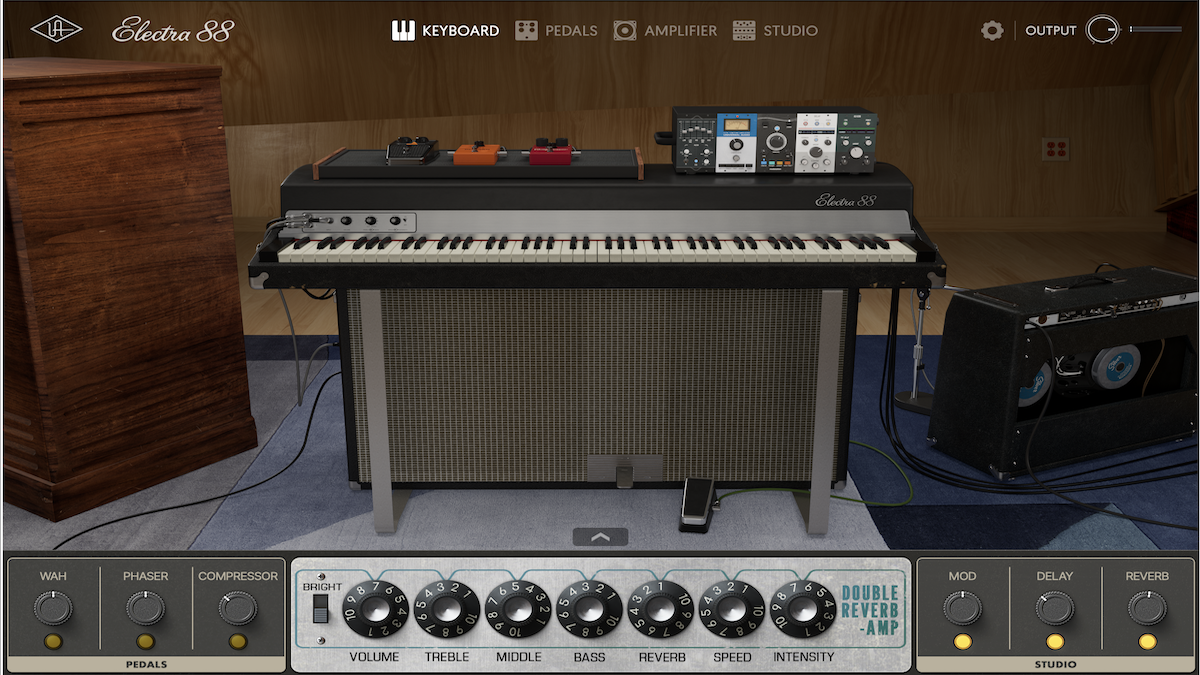
Rhodes V8
The mighty Rhodes keyboard has recently been reborn into the Rhodes Mk8 which has been causing huge waves in the Rhodes community, but doesn't come cheap. Fortunately, the same team behind this new hardware has come up with this much more affordable software version, the V8.
Rhodes V8 is available in Standard and Pro edition formats. Both plugins are similar sonically, but the Pro version provides a greater degree of control, right down to the individual note level. Upgrading to the Pro version also provides more effects such as compression, chorus and phasing.
Once you begin to play the V8, you immediately get lost in the Rhodes sound. Apart from the dexterity and control available from the keyboard, it is equipped with effects which have become attached by association. These include overdrive at the preamp stage, EQ-based tone controls, and the vari-pan effect, which provides the classic ping- pong associated with vintage Rhodes Suitcase models.
V8 is packed full of presets and has capacity to go beyond the basic Rhodes sound towards Rhodes-esque mutations or classic variations. It’s a classy reproduction in a stylish package.
Rhodes V8 costs £149.95 for the Standard edition and £249.95 for the Pro.
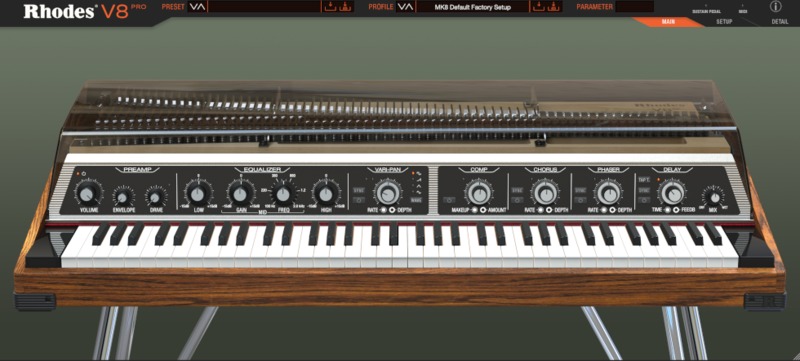
Applied Acoustic Systems Lounge Lizard 4
If our increasingly terrible memories are correct, the original Lounge Lizard was one of the very first virtual instruments, possibly released before the name 'virtual instrument' even existed.
While the fourth incarnation has come along way in terms of its interface and quality, it is still a simple instrument, with its core focus still being the reproduction of great electric piano sounds.
You select presets – from over 240 – from the top area of the the UI. There are standard effects in the centre with a compressor, EQ, chorus, phaser, and reverb. The bottom area has more specific electric piano parameters to tweak including hammer noise, pickup symmetry, and tremolo controls.
Sound wise, for the money you're probably getting more per buck here than most other pianos in this roundup. There are true tones with little colour but also rich effected presets ladled with tremolo. There is also still plenty of scope for experimentation – in fact Lounge Lizard has always been capable of going far beyond traditional electric piano emulations. But it's the core Rhodes and Wurli-like sounds that have always been 'the Lizard's' strengths and, for the money, there's still little out there that beats it.
Lounge Lizard usually costs $99 and you can get more info at Applied Acoustic Systems.
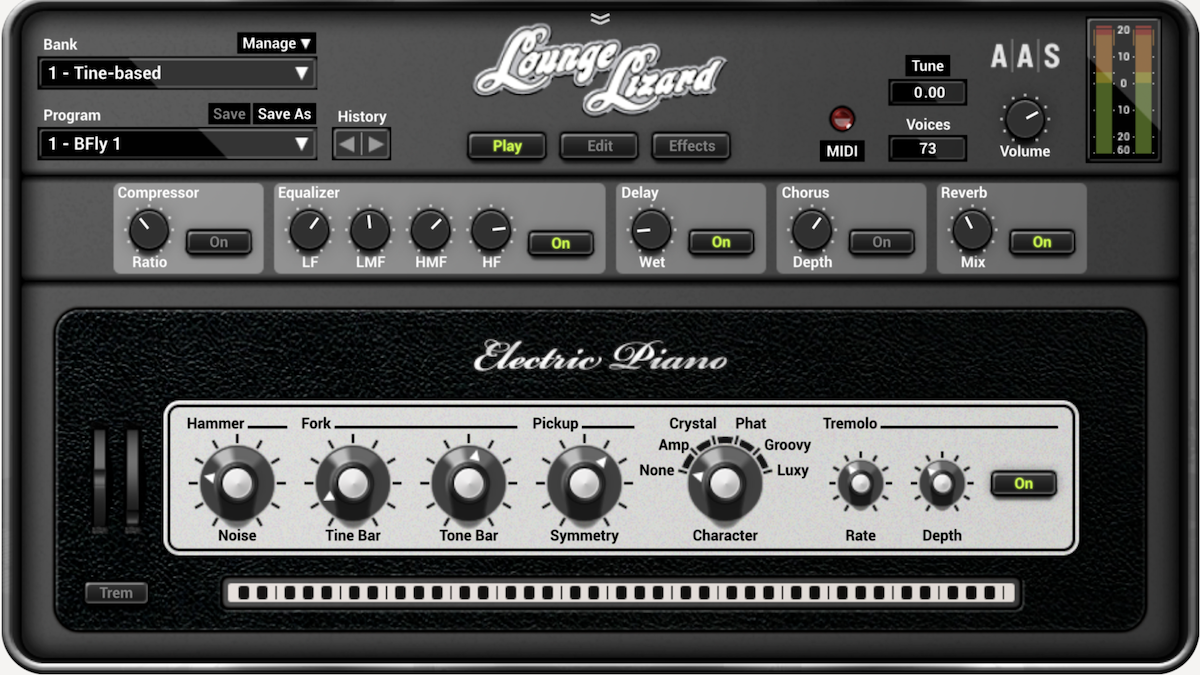
Waves Electric Grand 80
Yamaha’s CP-80 electric grand piano is a bona fide classic, as made legendary in the 80s by the likes of Elton John, Phil Collins, Peter Gabriel, Toto, Herbie Hancock and many more.
This budget Waves VST/AU/AAX plugin is a sample-based emulation of it, and keeps things as simple as such a thing should be, but still manages to work in a handful of useful extras.
It's built around a 500MB bank of multisamples captured at a range of velocities and with round-robin variations. It employs separate sampler engines for the Main, Key Up/release, Mechanical and Pedal sounds, and the four faders controlling them make it a cinch to get your desired blend of notes and noises.
Electric Grand 80 sounds as near as dammit to the real thing as any CP-80 emulation we’ve heard, with the four mixable sound sources opening up plenty of raw sound customisation, and the Formant filter making a helpful partner to the standard EQ.
The best part is that Electric Grand 80 costs just $79, and that is before any of Waves' equally legendary sales play their part.
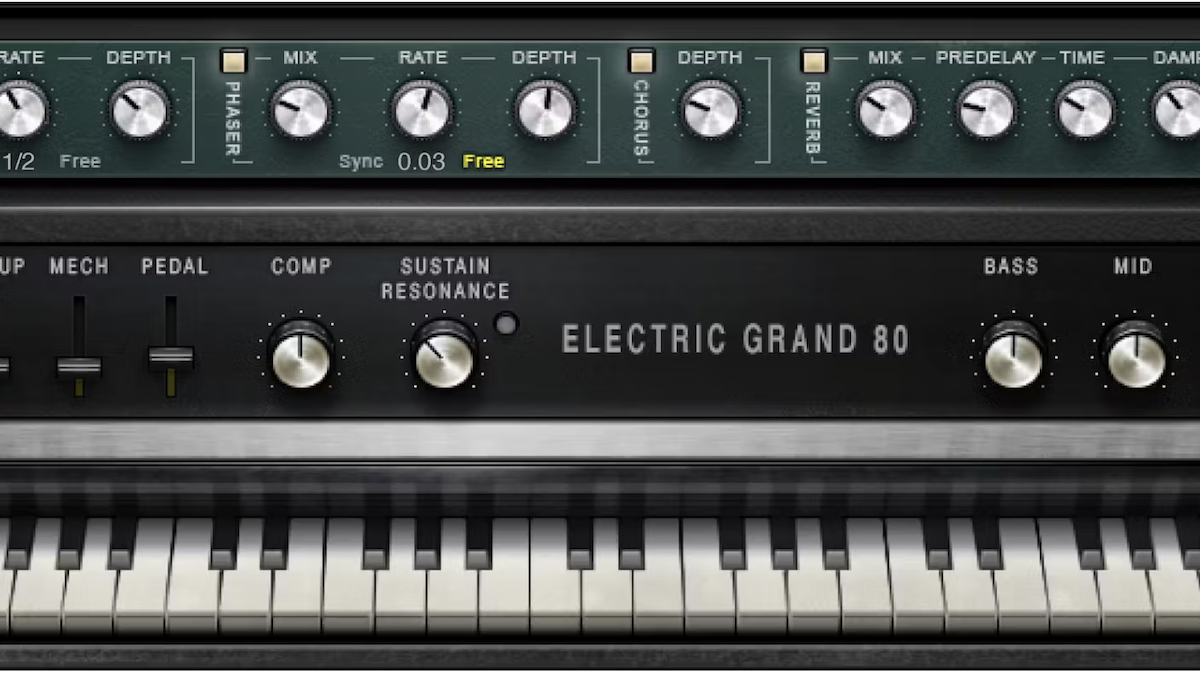
Toontrack EZ Keys Expansions/EZ Keys 2
Toontrack's range of EZ Keys keyboard titles can be bewildering to the uninitiated, but they essentially break down into the mothership software, EZ Keys 1 or 2, and its EKX sound expansions and EZ Keys MIDI expansion packs.
The expansions add famous keyboard models to either EZKeys 1 and 2, which you'll need as a starting point – the all-new EZ Keys 2 shown in the video above costs between €99 and €179 – but they do represent great ways to get pro keyboard sounds and playing styles in your tunes. The EZ Keys MIDI packs, on the other hand, add playing styles and techniques from different genres.
While this might be a rather confusing approach, it can net you a very specific keyboard rig and compositional help for whatever genre you produce music in, so gets an inclusion here as you can tailor it to be the ultimate suite of electric pianos.
We've tested several of the electric piano expansions over the years including eZkeys Electric Grand which is based on the Yamaha CP-80; and Dream Machines, which includes a Rhodes Mk 7, and which we described as having “effortless sound shaping, great playability and silky sonics that has us beaming”.
Once you get your head around the EZ Keys concept – and to be honest, this is probably easier (or indeed EZ-er) than you might think – then this is a great and cost-effective route into quality electric piano instruments plus all the playing styles you could wish for.
EZ Keys Expansions typically cost €89 and you can get more info on the EZ Keys ecosphere here.
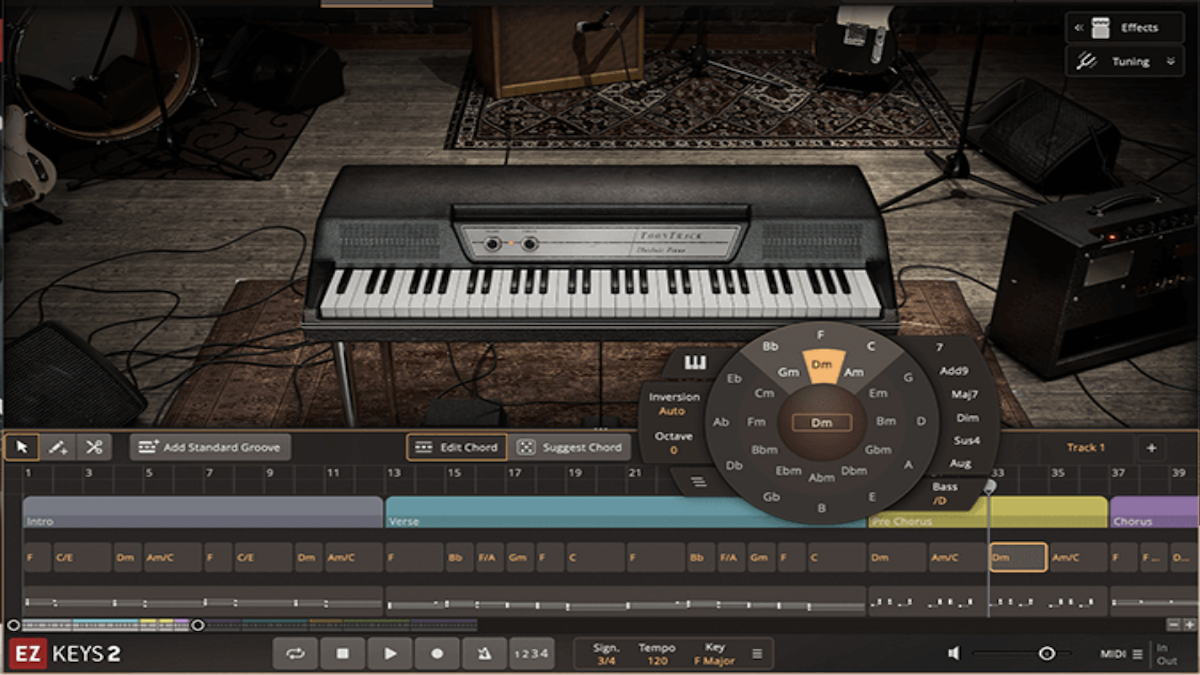
Looking for more great keyboard gear and technique articles? Get all our reviews, news, features, tutorials, tips and more at our Keys Week 2023 hub page.


Andy has been writing about music production and technology for 30 years having started out on Music Technology magazine back in 1992. He has edited the magazines Future Music, Keyboard Review, MusicTech and Computer Music, which he helped launch back in 1998. He owns way too many synthesizers.
MusicRadar deals of the week: I'm feeling this! Score an impressive £350 off the Fender DeLonge Starcaster, as well as hundreds off Epiphone, Gretsch, Gibson and more
We didn't think we needed a compact 4-octave acoustic piano that can also work as a MIDI keyboard, but the super-cute Keybird L1 might have convinced us otherwise










